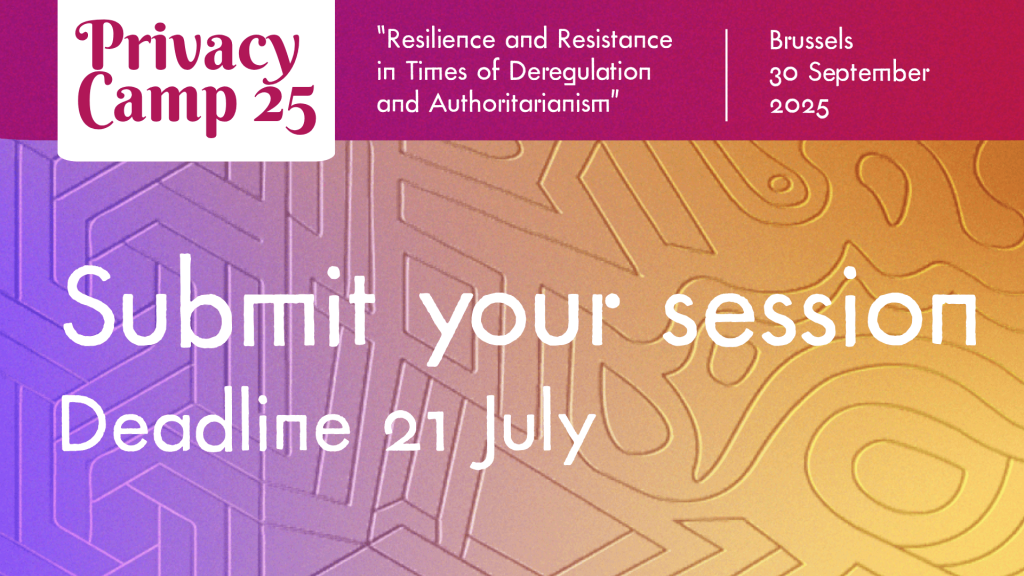
The 13th edition of Privacy Camp is set to take place on 30 September 2025.
Our rights and freedoms – online and offline – are facing unprecedented threats. Recognising this as a collective struggle, we want to explore the theme Resilience and Resistance in Times of Deregulation and Authoritarianism for this edition of Privacy Camp.
From policy shifts to crackdowns on human rights defenders, increasing militarisation within and at borders, to systemic repression across civil society, academia, and the general public more broadly — the landscape of rights, freedoms, and justice is under growing strain.
Fundamental rights in the digital sphere are under particular pressure in the name of ‘competitiveness’ and so-called ‘simplification’. This is manifesting as a wave of deregulation on some of the most important legislative wins for digital rights in the past few years, such as the General Data Protection Regulation (GDPR), the Artificial Intelligence (AI) Act, and more. In Europe and beyond, there is a blatant disregard for existing laws and institutions, and an ongoing deligitimisation of our rights to privacy and data protection.
As a field, we see persistent violent crackdowns on the pro-Palestine solidarity movement, the erosion of hard-fought rights by LGBTQI+, migrants, and other historically marginalised communities. There is being enabled by an increasing far-right political landscape in Europe and beyond. At the same time, techno-solutionism is reaching new highs. Technology is often being proposed as a tool for enabling austerity measures, as well as Europe’s competitiveness and militarisation.
At Privacy Camp 2025, we will explore: How do we build and sustain resilience and resistance in times of deregulation and authoritarianism?
We invite proposals that address this question head-on, especially those that centre practices of connection, care, and collective action. This includes — but is not limited to:
- EU’s wave of digital policy ‘simplification’: unravelling of many existing rights protections, including attacks on EU’s landmark recent tech laws (eg: GDPR’s possible ‘re-opening’, pausing and re-evaluating the AI Act) under economic and political pressure.
- Securitisation: acceleration of tech-enabled surveillance and its impact across borders and on immigration violence (e.g. Frontex), racist policing practices, militarisation
- Repression of dissent: shrinking civic spaces, threats to academia, civil society, grassroots movements in the EU and beyond
- Collective rights: Strategic litigation and movement-building across different areas (eg, labour, climate, welfare, public services, etc)
- Structures of care and resistance: from advocacy and legal action, to grassroots organising, community and coalition building — which tactics and strategies work, how do they intersect, and what needs rethinking in this current moment?
- How do we build sustainable actions and relations to protect each other, resist burnout and isolation? How do we centre care in our advocacy?
- Solidarity and sharing knowledge across borders: What does transnational organising and solidarity look like in the face of increasing surveillance and repression?
Session formats
We particularly encourage proposals for interactive workshops — formats that foster small-group work, peer exchange, and collaboration across sectors, coalitions and disciplines. Workshops are a space to share practices, brainstorm and experiment together, moving from talk to strategic action.
While our preference for this year are proposals for workshops, we also welcome proposals for panel discussions, especially those that centre diverse voices and grounded lived experience, and which leave space for meaningful audience engagement.
Submission guidelines:
- Indicate a clear objective for your session, i.e. what would be a good outcome for you?
- Make it as interactive as possible and encourage audience participation
- Support diversity of voices among panelists and strive for multiple perspectives.
- Note that the average session length is 50 minutes.
For workshop proposals: workshops can employ different forms, tools and use of materials to ensure that participants connect with each other, and for the session to be interactive and inclusive. Ensure participants get to work with each other in small groups towards a specific relevant goal.
For panel proposals: include a list of a maximum 4 speakers that could participate in your panel. Ensure you cover academia, civil society and decision–makers’ perspectives. Let us know which speaker(s) has/have already confirmed participation, at least in principle.
To submit a proposal, please fill in this form by 21 July, 09.00 AM CEST.
Timeline
The Privacy Camp Content Committee will review submissions and will notify you about the outcome of the selection procedure before 4 August 2025. Please note that we expect you to confirm your panel (only the title) by 6 August. On 7 August, we will publish a draft programme. You will need to confirm your final speakers and final description by 8 September 2025. We will publish the final programme on 16 September.
About Privacy Camp
Privacy Camp is organised by European Digital Rights (EDRi), in collaboration with its partners the Research Group on Law, Science, Technology & Society (LSTS) at Vrije Universiteit Brussel (VUB), Privacy Salon vzw , the Institute for European Studies (IEE) at Université Saint-Louis – Bruxelles and the Racism and Technology Center.
Privacy Camp 2025 will take place on Tuesday, 30 September 2025 in a hybrid format (in Brussels, with online broadcast). Participation is free and registrations will open in July 2025.
In 2025, Privacy Camp’s Content Committee comprises of Andreea Belu (EDRi), Gloria González Fuster (LSTS, VUB), and Jill Toh (Racism and Technology Center). Interested in joining the Privacy Camp Content Committee? Reach out.
For inquiries about the programme please contact Andreea Belu at andreea.belu(at)edri(dot)org.
